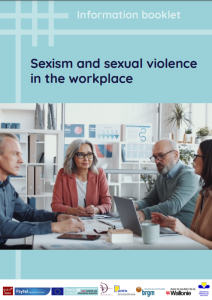Sexism at work : inseparable from harassment at work ?
Inappropriate comments, heavy jokes, hands on the buttocks… are prohibited by law.
But still very present! How to cope? How to end it? What are we talking about ? Sexist actions? Sexual harassment? Sexual assault? Who to turn to? How to provide evidence? What should the employer do?

Gender-based and sexual violence is very present in the world of work. This violence is very little reported and very little treated. Employees are poorly informed and often underestimate the seriousness of this violence.
We want to help actors detect this sexist violence at work: sexist actions, sexual and moral harassment, private pressure, exposure to pornographic material, sexual exhibition, inappropriate gestures, sexual assault, etc.
Harassment is an act which, according to the Istanbul Convention against Violence Against Women, is predominantly experienced by women and directed by men. This therefore implies a form of power of men over women.
The Convention aims to create a legal framework to protect women against this violence at European level. Our objective is to bring this protection framework within companies fighting against harassment at work in Belgium.
The website shares with key players in a company as well as with the general public a MOOC (Massive Open Online
Course = open type of distance learning) to raise awareness and inform companies about the negative consequences of sexual harassment in the workplace as well as in the hope of reducing sexual harassment and sexist behavior in the workplace.
Visit our resources tab if you are looking for definitions of specific concepts, existing tools for promoting gender equality at work or current legislation. For the most common questions, browse our FAQ. Do not hesitate to contact us if you wish !
The business MOOC

The business MOOC (Massive Open Online Course) was developed by our association, in partnership with Psytel and Amazone ASBL to raise awareness and inform companies about the negative consequences of sexual harassment at work.
The MOOC is an online course that aims to reduce sexual harassment and sexist behavior at work, which can answer the question “harassment at work: what to do?” so often asked.
It was developed as part of the Rights, Equality and Citizenship program of the European Commission. The project is co-financed by Wallonia and the Brussels-Capital Region.
Following a 2016 study by Jump, 9 out of 10 women say they have been victims of gender-based violence at work. (95% 7 out of 10 women have already been victims of intrusive looks and/or inappropriate gestures in the workplace. A quarter of the women questioned say they have been harassed or physically attacked.
Although the victims of harassment in the workplace are predominantly women, this MOOC also addresses cases of woman-on-man, man-on-man or woman-on-woman violence.
Important concepts
The objective of the MOOC is to provide a detailed overview of initiatives relating to the fight against sexual harassment and sexist (gender-based) violence at work.
According to the European Institute for Gender Equality (EIGE), gender-based violence is “both a cause and a consequence of gender inequality”.
The mission that our association has given itself to fight against and raise awareness of harassment at work is directly linked to gender equality.
The European body EIGE also offers a definition of sexual harassment:
« The situation in which unwanted behavior has a sexual connotation, expressed physically, verbally or non-verbally, occurs with the object or effect of violating the dignity of a person and, in particular, of creating an environment intimidating, hostile, degrading, humiliating or offensive. »
Workplace violence is also an important concept in the fight against workplace harassment, whether sexual or sexist (gender-based).
Gender-based and sexual violence at work covers several types of behavior, is part of professional risks, is prohibited by law and must be banned by the employer.
And Belgian law?
The law on well-being at work (dated August 4, 1996) provides for the prohibition of sexual harassment, violence and harassment at work in Belgian law. Later, in 2007, the law included sexual harassment as gender discrimination.
According to this law, the victim of harassment can act on two levels: first, a procedure is proposed internally to resolve the harassment situation without going to court. If this is unsuccessful, the victim can appeal to the Labor Court.
Why an online course on gender-based and sexual violence in the workplace?
Although these notions and themes have been widely taken into account in recent years, companies lack official guidance to combat moral or sexual harassment in the workplace. The fight against harassment is fundamental for the physical or mental health of employees.
This is why our association has given itself the mission of creating a Massive Online Open Course (MOOC) (in collaboration with Pystel and Amazone), i.e. online training, to help companies provide information on sexual harassment at work and its consequences. Negative consequences.
Some objectives

The aim of this training is multiple:
First, the training aims to facilitate awareness of the types of sexist behavior in our society and in the workplace.
Then, the training aims to raise awareness of the gender and sex stereotypes that are at the origin of sexual harassment.
Participants are also encouraged to understand the responsibilities of company stakeholders in the face of harassment.
Finally, the training equips participants to implement concrete actions against sexual harassment in the company. How to file a complaint for harassment at work, instruction on harassment at work and the law, what to do in the event of harassment at work, …
To participate, go here and directly to the MOOC on harcelementviolencesexisteentreprise.eu
Conference on sexist and sexual violence at work
In 2021, Psytel and MEFH organized a conference on the subject of gender-based violence in the workplace. The idea was to propose the perspectives of the fight at the level of company policy or at a more global level, starting from concrete examples. We thus invited representatives of lawyers, politicians, union agents or those responsible for managing these issues in business. All interventions can be viewed by clicking play.

This website was funded by the Rights, Equality and Citizenship program of the European Union (2014-2020).
The content of this website represents solely the point of view of the author and is his sole responsibility. The European Commission accepts no responsibility for the use that may be made of the information it contains.



